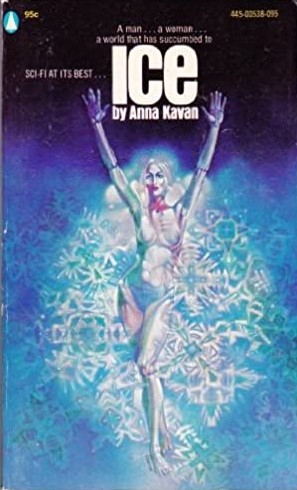 By ANNA KAVAN (Popular Library; 1967/70)
By ANNA KAVAN (Popular Library; 1967/70)
This bizarre novel is widely acclaimed as the masterpiece of England’s Anna Kavan (1905-1968). The author of hallucinogenic classics like SLEEP HAS HIS HOUSE, ASYLUM PIECE and JULIA AND THE BAZOOKA, Kavan spent a large part of her life interned in mental institutions, and eventually died from a heroin overdose (not long, in fact, after ICE was published). In a direct reflection of her overall mental state, Kavan’s novels and stories are all first and foremost profoundly bleak. ICE is no different, being a quasi-science fictional account of devastation both personal and societal.
Where ICE differs from most of Kavan’s other books is in its accessibility. The novel is never less than crisp and readable, even if it is (to quote from the introduction by Brian Aldiss) “nearer Cocteau than Arthur C. Clarke.” Proving this point is Kavan’s posthumously published novella MERCURY, which is actually a discarded draft of ICE that differs from the latter in its complete lack of narrative cohesion.
In the future world depicted in ICE, society is breaking down. Nuclear war has somehow caused the world to become dominated by rogue icebergs that threaten what remains of civilization. Amid all this chaos our few-bricks-shy-a-load narrator pursues “the girl” (nobody has any names in this book) through an unidentified country under military rule. The girl is dominated by a brutish warden who, it transpires, has a definite relationship of sorts with the protagonist.
Neither he nor we are ever quite sure why the narrator is so obsessed with the girl, but then it’s clear from the start that this guy’s grip on reality is tenuous at best. A FIGHT CLUB-like twist partially clears things up, but the nightmarish atmosphere conjured by Kavan remains peerlessly mysterious.
The deadly icebergs of this novel have been likened by some critics to the author’s drug addiction. The sense of impending doom conveyed in these pages does indeed feel a bit too authentic for comfort, with Kavan’s talent for hallucinatory devastation fully evident in subtly unnerving lines like this one: “A mirage-like arctic splendor towered all around, a weird, unearthly architecture of ice…we were trapped by those encircling walls, a ring of ghostly executioners, advancing slowly, inexorably to destroy us.”
